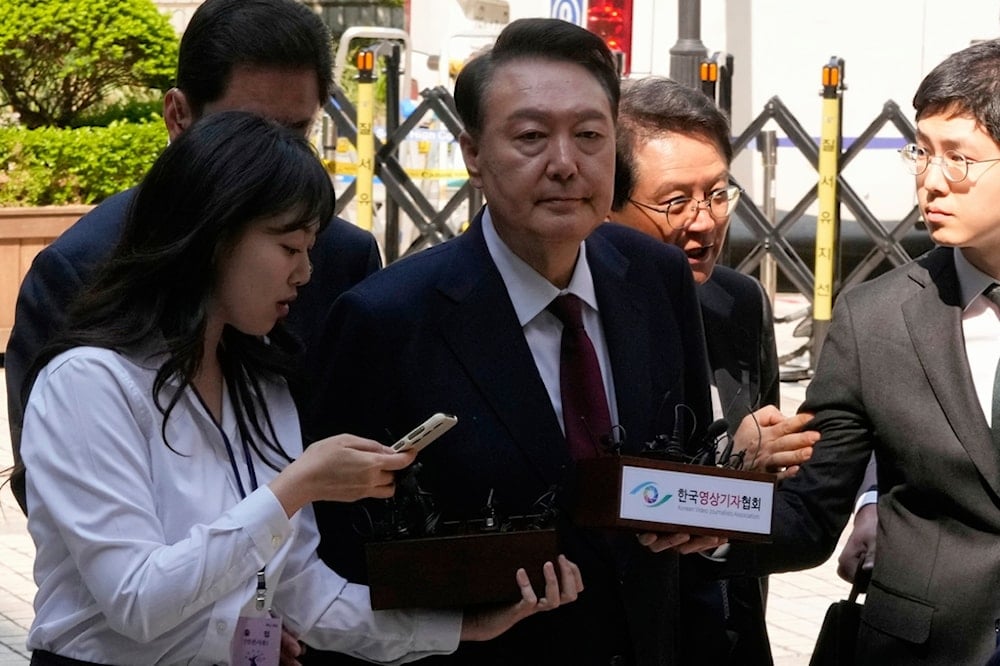South Korea President answers summons, faces threat of another arrest
Yoon Suk Yeol is under intense investigation and facing trial for attempting to impose martial law to derail his impeachment.
-

South Korea's ousted former President Yoon Suk Yeol, center, who is facing charges of orchestrating a rebellion when he declared martial law on Dec. 3, arrives to attend his trial at the Seoul Central District Court in Seoul, South Korea, Monday, May 12, 2025. (AP, Pool)
Former South Korean President Yoon Suk Yeol appeared before a special prosecutor on Saturday in connection with an intensifying investigation into his controversial attempt to impose martial law in December 2024. The appearance comes after weeks of legal wrangling and a narrowly avoided second arrest.
Yoon's legal team has criticized the special prosecutor's demands that he appear publicly, describing the move as a violation of the former president's rights and a deliberate attempt to humiliate him. In a statement issued ahead of his appearance, his lawyers said Yoon would "respond to the investigation on Saturday and tell the truth," while denouncing the inquiry as "politically motivated" and "full of falsehood and distortion."
He declined to answer questions from reporters as he entered the prosecutor's office in central Seoul.
Martial reckoning
The inquiry focuses on Yoon's declaration of martial law on December 3, a move that sent shockwaves through a nation long viewed as a model of democratic progress after decades of authoritarian rule. The declaration, widely condemned at home and abroad, was allegedly aimed at stalling impeachment proceedings by militarizing the capital and arresting dissenting lawmakers.
Following a rapid escalation of public and parliamentary backlash, Yoon was impeached by the National Assembly. His removal from office was confirmed by the Constitutional Court in April.
Read more: South Korea jails two over courthouse riot linked to ex-president
The special prosecutor, appointed by current President Lee Jae-myung in early June, has since launched an expansive investigation, assembling a team of over 200 prosecutors and investigators. Yoon, once South Korea's top prosecutor before being elected president in 2022, is already standing trial on charges including insurrection, abuse of power, and obstruction of justice.
In addition to the martial law declaration, investigators are examining allegations that Yoon ordered military units to resist his arrest and directed the deletion of encrypted presidential communications and military orders. These orders, if verified, could strengthen the prosecution's case that Yoon attempted to subvert the constitutional order.
Democracy put to the test
Yoon was initially taken into custody in January after resisting law enforcement officers executing a court-issued warrant. He was held for 52 days before being released on legal technicalities. Earlier this week, the special prosecutor's office sought another arrest warrant due to his prior refusal to comply with multiple summonses. However, a court rejected the request, noting Yoon's recent willingness to cooperate.
The stakes are high: if convicted on the most serious charges, Yoon could face life imprisonment or even the death penalty, though South Korea has not carried out an execution since 1997.
As part of a broader response to the crisis, President Lee has moved to reinforce civilian oversight of the military by appointing the country's first non-military defense minister in over six decades. The reform is widely seen as a symbolic effort to distance the government from South Korea's legacy of military authoritarianism.
Yoon's case has drawn widespread public attention and ignited fierce debate about the fragility of democratic institutions, the limits of presidential power, and the importance of accountability—even for a former head of state.
Read more: Asia allies wary as US considers troop shift from South Korea: WSJ

 3 Min Read
3 Min Read










